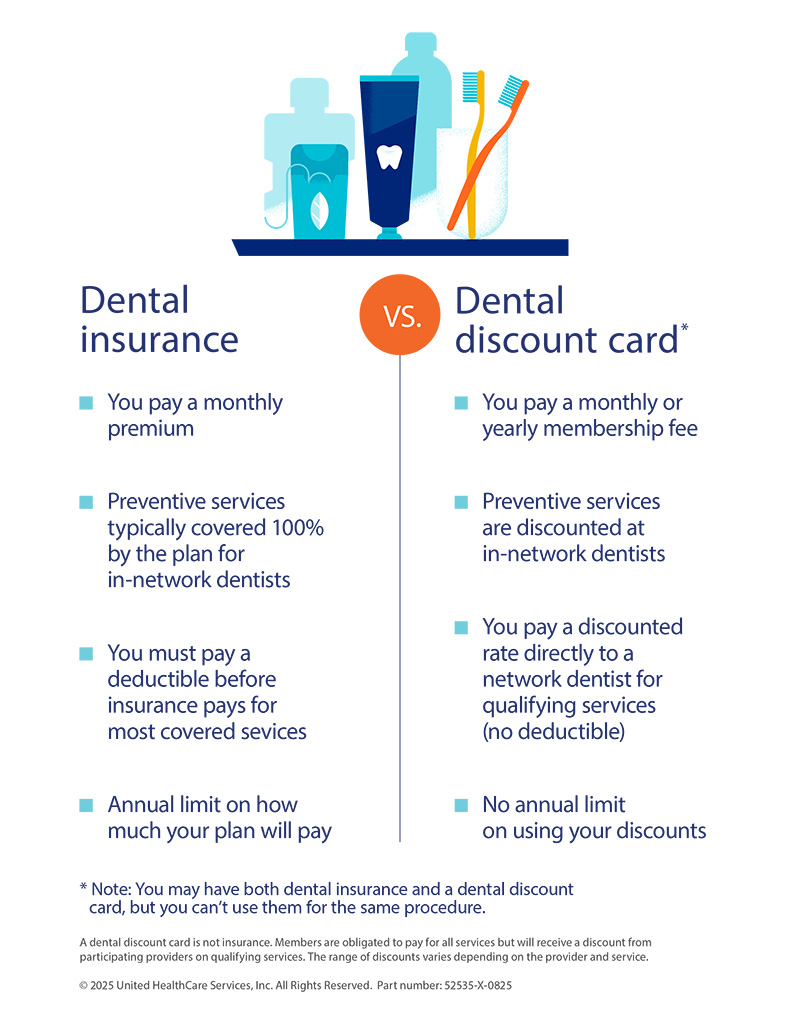If you have a health insurance plan, you probably realize there are certain things you can count on it to cover. But there may also be a few gaps in your coverage. One of them could be dental care, which is essential to your oral health.
That’s why it’s often a good idea to buy supplemental dental insurance, says Louise Norris. She’s a health policy analyst for healthinsurance.org. Supplemental insurance is a type of insurance that you pay for on top of your traditional health insurance plan.
But it can be difficult to sort through the different plans out there. What does dental insurance cover, exactly? And what is the best dental insurance? Here’s a closer look.
Did you know that regular teeth cleanings and X-rays may come at no cost to you with insurance? Explore dental insurance plans now.
What is dental insurance?
Dental insurance helps pay for the cost of visits to your dentist for basic or preventive services. This includes teeth cleanings, X-rays and fillings.
If you get health insurance through your employer, there’s a good chance that they may offer dental coverage too, explains Norris. But if you buy individual health insurance, you’ll generally need to shop for a stand-alone dental plan or a dental and vision plan. The same is true if your company doesn’t offer dental insurance.
When it comes to Affordable Care Act (ACA) health insurance plans, dental coverage is an essential health benefit for children ages 18 and younger. (That means dental coverage must be made available to them.) It must be part of your health plan or offered as a separate dental plan. While it must be made available to you for them, you don’t have to buy it.
But dental coverage isn’t an essential health benefit for adults who get ACA insurance. As a result, health plans don’t have to offer it.
What do I need to think about when shopping for a dental plan?
Here are some things to keep in mind:
- What does dental insurance cover? Usually, preventive services such as cleanings, exams and X-rays are covered 100%, explains Norris. Basic services like fillings, extractions and root canals are usually covered at 70% or 80%. The cost of more substantial services like crowns, bridges and implants may be split 50/50 between you and your plan. This is true until you reach the benefit cap, says Norris.
- Is the dentist you want to go to covered under this plan? If you want to keep your current dentist, you’ll want to find out what dental insurance plans they accept. But if it doesn’t matter which dentist you see, “sign up for the best dental plan you can find. Then look for a dentist in that network,” advises Norris.
- What is the benefits cap on the plan? Stand-alone adult dental coverage may have a cap of around $1,500, says Norris. That’s generally enough if you just need preventive care. It’s also usually enough if you need routine dental work like an occasional cap or filling. But if you need a lot of dental work, such as multiple implants, it may not be enough to meet your needs.
- Is there a waiting period? Some dental plans require a waiting period for anything other than preventive care. This is to prevent you from just signing up for a plan to pay for your root canal, says Norris.
You may want to see if this waiting period can be waived. Some plans will let you do so if you show that you already had dental insurance before you enrolled. Some plans may also require you to pay 75% of the cost of major services in your first year. Then they may require you to pay 50% in the second year. “There are a lot of differences in terms of nuances,” explains Norris.
Get this: Fillings and root canals might not mean major medical bills. Learn how dental insurance can cover you.

How much does dental insurance cost?
It varies from state to state, says Norris. “It’s hard to point to an average premium because plans and benefits vary widely,” she explains. (Your premium is the monthly bill you pay for insurance.) Very low premiums may only cover preventive care. Or they may have higher copayments and deductibles.
A higher payment plan may mean shorter waiting periods. But it may also mean a bigger dental network and lower copayments and deductibles. “In general, we recommend that you have some sort of plan. It will at least get you in to see your dentist on a regular basis,” says Norris. “That alone is a worthwhile benefit.”
Where can I buy dental insurance?
If your employer offers dental insurance, you can purchase it through them, says Norris. Otherwise, you may want to shop for a stand-alone plan, which you can buy directly from a company that offers dental coverage for your area.
If you are buying health insurance on the federal Health Insurance Marketplace, you may be able to pick a health plan with dental benefits, notes Norris. Otherwise, you can buy a stand-alone plan. But you can’t buy a federal Marketplace dental plan unless you’re buying a health plan at the same time. In states that run their own exchanges instead of using the federally run platform, it’s common for them to allow the purchase of a dental plan even if the person is not enrolling in a health plan.
You can also only buy Marketplace coverage (including medical plans or dental plans) at certain times during the year. This would be during the annual Open Enrollment Period, which typically runs from November 1 to January 15 in most states, or if you qualify for a Special Enrollment Period. That would be available if you have what is known as a qualifying life event, such as getting married or divorced or having a baby. If it’s outside of those enrollment periods, you’ll need to go through a dental insurance company directly.
Big bills don’t have to get in the way of your dental health. Here’s how a supplemental dental plan can help keep costs down. Learn more online, or call a licensed insurance agent at 1-844-211-7730 for more information.
This article contains information that is compiled by UnitedHealthcare or its subsidiaries. UnitedHealthcare does not represent all the information provided are statements of fact. Please consult directly with your primary care physician if you need medical advice.
Sources:
HealthCare.gov. “Dental coverage.” Retrieved from https://www.healthcare.gov/glossary/dental-coverage/ Accessed April 9, 2024
HealthCare.gov. “Health benefits and coverage: Dental coverage in the Marketplace.” Retrieved from https://www.healthcare.gov/coverage/dental-coverage/ Accessed April 9, 2024
Compliance code:
50918-X-0424











